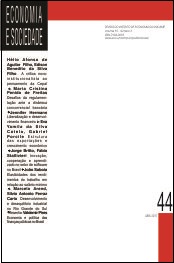Resumo
Este artigo apresenta criticamente diferentes interpretações da crise atual. Orientaram a seleção das várias contribuições a representatividade das teorias marxistas clássicas de crise e a importância das novas abordagens correspondentes aos novos fenômenos em desenvolvimento no capitalismo atual. O exame crítico dessas contribuições revela uma linha divisória entre aqueles que concebem a crise como tendo sido causada pelo afluxo dos lucros da produção para as finanças (Husson e Foster /Magdoff) e aqueles para os quais o aumento do crédito de consumo foi resultado de uma reestruturação dos fluxos de crédito das empresas, cada vez mais autônomas no mercado de dinheiro, às famílias assalariadas, cada vez mais dependentes do financiamento bancário. Essa linha divisória reflete a importância que o primeiro grupo adjudica à diminuição do ritmo de crescimento vis-à-vis os teóricos da School of Oriental and African Studies. A análise revela também que a atrofia da economia política leva a um abandono precoce da teoria bancária e financeira de Marx em favor dos instrumentos teóricos pós-keynesianos imediatamente disponíveis para o uso.
Abstract
This article is a critical survey of different interpretations of the 2007-2008 financial crises. They were chosen either because they represented classical Marxian views on crisis, such as the underconsumption or over-accumulation theories, or else because they were newly developed interpretations based on recent newly economic developments, as it is the case of the financial expropriation theory. The analysis reveals three main points of view. The first is that the cause of crisis is the stagnation of the economy and the ensuing transfer of profits from production to finance, process that caused the housing-financial bubble (Husson and Foster/Magdoff). The second view argues that it was the structural change in financial markets which led banks to increasingly rely on consumer credit as a profitable alternative to corporate financing which has become increasingly independent from bank sources (Lapavitsas and dos Santos). The third view argues that low rates of profit caused sluggish growth rates while governments tried to compensate for by promoting demand through cheap credit (Kliman). Finally, it is worth noticing that the incipient use of Marxian categories to the analysis of banking and finance leads systematically to the use of the postKeynesian theories immediately available thus reproducing its condition of underdevelopment.
Keywords: Marxian theories of crises. Rate of profit. Stagnation
Referências
BARAN, Paul; SWEEZY, P. Monopoly capital: an essay on the American economic and social order. New York and London: Modern Reader Paperbacks, 1968.
BRENNER, R. What is good for Goldman Sachs is good for America: the origins of the current crisis. Los Angeles, CA: UCLA. Center for Social Theory and Comparative History, Apr. 18, 2009. (Prólogo da tradução para o espanhol do livro Economic of Global Turbulence, maio 2009).
DOS SANTOS, Paulo. At the heart of the matter: household debt in contemporary banking and the international crisis. Research on Money and Finance, Discussion Paper, n. 11, May 11, 2009. Disponível em: www.soas.ac.uk/rmf.
FINE, B. Financialisation, the value of labour power, the degree of separation, and exploitation by banking. London: SOAS, Apr. 2009.
FOSTER, John Bellamy; MAGDOFF, Fred. The great financial crisis. New York: Monthly Review Press, 2009.
GIUSSANI, Paolo. Il movimento del saggio del profitto secondo Andrew Kliman. Milan, May, 2010. (Primeira versão provisória).
HUSSON, Michel. La hausse tendancielle du taux de profit. Jan. 2010. Disponível em: http://hussonet.free.fr/cricoco.htm.
HUSSON, Michel. Marxists on the capitalist crisis: 7. Michel Husson – A systemic crisis, both global and long lasting. Jul. 2008. Disponível em: http://www.workersliberty.org.
JOSHUA, I. Notes sur la trajectoire du taux de profit. Contretemps, Oct. 2009. Disponível em: http://contretemps.eu.
KLIMAN, Andrew. ‘The destruction of capital’ and the current economic crisis. Jan. 15, 2009. Disponível em: www.socialistdemocracy.org.
KLIMAN, Andrew. On the roots of the current economic crisis and some proposed solutions. Apr. 17, 2009.
KLIMAN, Andrew. The persistent fall in profitability underlying the current crisis: new temporalist evidence. 2ª versão. Oct. 17, 2009.
KLIMAN, Andrew. Masters of words: a reply to Michel Husson on the character of the latest economic crisis. Feb. 19, 2010.
KLIMAN, Andrew. A crisis for the centre of the system. Oct. 2008.
ITOH, Makoto. On the historical significance and the social costs of the sub-prime financial crisis: drawing on the Japanese experience. Research on Money and Finance, Discussion Paper, n. 7, Mar. 15, 2009. Disponível em: www.soas.ac.uk/rmf.
LAPAVITSAS, Costas. El capitalismo financiarizado. Madrid: Maia Ediciones, 2009.
LAPAVITSAS, Costas. Costas Lapavitsas interview: the credit crunch. International Socialism. Disponível em: http://www.isj.org.uk/index.php4?id=395.
MOSELEY, Fred. US home mortgage crisis: how bad will it be? Causes and solutions. 2008. Mimeografado.
SHAIKH, A. An introduction to the history of crises theories. In: URPE (Org.). U.S. capitalism in crisis. Urpe-Union for Radical Political Economics, 1978. p. 219-240.
SHAIKH, A. Organic composition of capital. In: EATWELL, J.; MILGATE, M; NEWMAN, P. (Ed.). Marxian economics – The New Palgrave. New York-London: W. W. Norton & Company, 1990.
SHAIKH, A. Valor, acumulación y crisis. Ensayos de economia política. Bogotá: Tercer Mundo Editores, 1991.
SWEEZY, P. Teoria do desenvolvimento capitalista. Rio de Janeiro: Zahar Editores, 1973.
YAFFE, D. Why the organic composition of capital must rise with accumulation. Disponível em: www.marxists.org/subject/economy/authors/yaffed/1972/note.htm
A Economia e Sociedade utiliza a licença do Creative Commons (CC), preservando assim, a integridade dos artigos em ambiente de acesso aberto.

